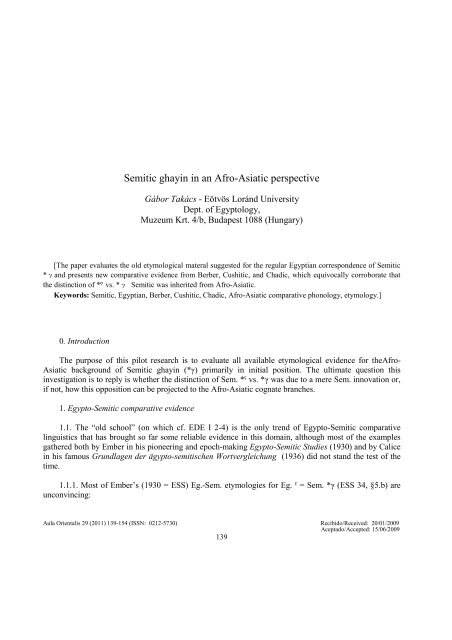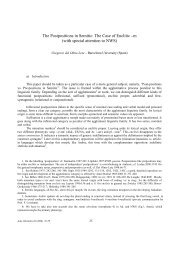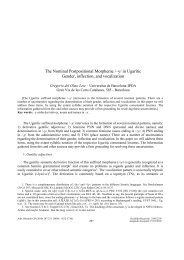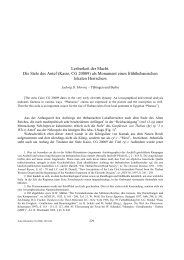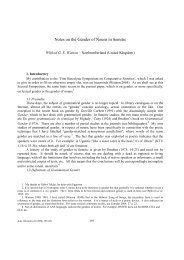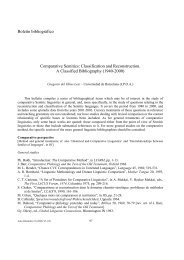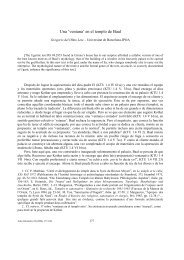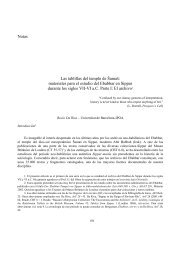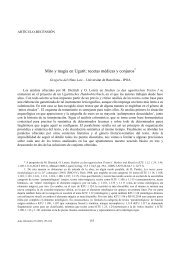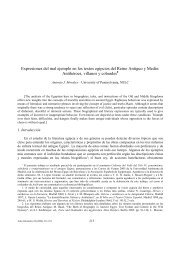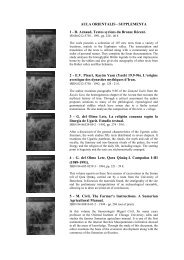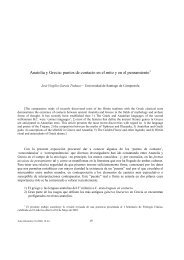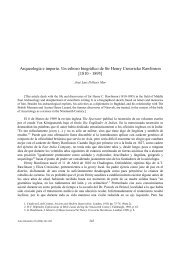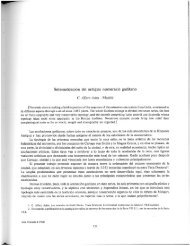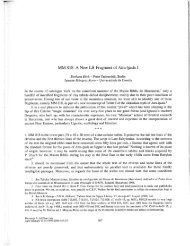Takacs-ghain-for.. - Aula Orientalis
Takacs-ghain-for.. - Aula Orientalis
Takacs-ghain-for.. - Aula Orientalis
Create successful ePaper yourself
Turn your PDF publications into a flip-book with our unique Google optimized e-Paper software.
Semitic ghayin in an Afro-Asiatic perspective<br />
Gábor Takács - Eötvös Loránd University<br />
Dept. of Egyptology,<br />
Muzeum Krt. 4/b, Budapest 1088 (Hungary)<br />
[The paper evaluates the old etymological materal suggested <strong>for</strong> the regular Egyptian correspondence of Semitic<br />
*γand presents new comparative evidence from Berber, Cushitic, and Chadic, which equivocally corroborate that<br />
the distinction of *« vs. *γ Semitic was inherited from Afro-Asiatic.<br />
Keywords: Semitic, Egyptian, Berber, Cushitic, Chadic, Afro-Asiatic comparative phonology, etymology.]<br />
0. Introduction<br />
The purpose of this pilot research is to evaluate all available etymological evidence <strong>for</strong> theAfro-<br />
Asiatic background of Semitic ghayin (*γ) primarily in initial position. The ultimate question this<br />
investigation is to reply is whether the distinction of Sem. *ˁ vs. *γ was due to a mere Sem. innovation or,<br />
if not, how this opposition can be projected to the Afro-Asiatic cognate branches.<br />
1. Egypto-Semitic comparative evidence<br />
1.1. The “old school” (on which cf. EDE I 2-4) is the only trend of Egypto-Semitic comparative<br />
linguistics that has brought so far some reliable evidence in this domain, although most of the examples<br />
gathered both by Ember in his pioneering and epoch-making Egypto-Semitic Studies (1930) and by Calice<br />
in his famous Grundlagen der ägypto-semitischen Wortvergleichung (1936) did not stand the test of the<br />
time.<br />
1.1.1. Most of Ember’s (1930 = ESS) Eg.-Sem. etymologies <strong>for</strong> Eg. ˁ = Sem. *γ (ESS 34, §5.b) are<br />
unconvincing:<br />
<strong>Aula</strong> <strong>Orientalis</strong> 29 (2011) 139-154 (ISSN: 0212-5730) Recibido/Received: 20/01/2009<br />
Aceptado/Accepted: 15/06/2009<br />
139
GÁBOR TAKÁCS<br />
● ESS §5.b.1: Eg. ˁ3b “wonderful, extraordinary” ~ Ar. γarīb- “stranger”. But Calice’s (GÄSW #519)<br />
equation of Eg. ˁ3b “angenehm sein” ~ Hbr. ˁrb “angenehm sein” seems more convincing.<br />
● ESS §5.b.2: Eg. ˁ3b “name of a tree” ~ Ar. γarab- “a kind of tree”. Cannot be judged. Calice<br />
(GÄSW #520) added Hbr. ˁarab “Populus euphratica”.<br />
● ESS §5.b.3: Eg. ˁw3j “to rob, plunder” ~ Ar. γwr III “to make a raid” (so also GÄSW #525), which<br />
seems correct.<br />
● ESS §5.b.4: Eg. ʕfn.t “head-covering” ~ Ar. mi-γfar- “helmet, head-covering”. Calice (GÄSW<br />
#378) added Akk. apāru “das Haupt bedecken”, Ar. γafara “bedecken”, γifār-at- “Kopftuch”. False<br />
because of the 3 rd radicals.<br />
● ESS §5.b.5: Eg. ˁrq “to swear” ~ Ar. γalaqa “to bind, confirm” (GÄSW #140a: Ar. γaliqa<br />
“verpfändet sein”), which seems correct.<br />
● ESS §5.b.6: Eg. ʕ š3 “to be numerous” ~ Ar. γatara “to be luxuriant”, which seems plausible in spite<br />
of the irreg. Eg. -š- ≠ Sem. *-t-.<br />
● ESS §5.b.7: Eg. šnˁ “granary” ~ Ar. šuγl-at- “heap of grain”. Declined by Calice (GÄSW #854)<br />
with right: “das äg. Wort heisst aber nach Wb. IV. 507. eigentlich ‘Arbeitsplatz’“.<br />
1.1.2. Calice (1936 = GÄSW) also gathered a great deal of unreliable parallels <strong>for</strong> Eg. ˁ = Sem. *γ:<br />
● GÄSW #1: Eg. 3ˁˁ “eine fremde Sprache sprechen” ~ Ar. laγā “schwätzen”, laγiya “erravit in<br />
dicendo”, Hbr. lˁˁ or lˁy “irre reden” etc. Acceptable.<br />
● GÄSW #12: Eg. ˁ3 “Esel” ~ Brb. *a-γyul “Esel”. But the latter corresponds better to Ar.<br />
ḫayl- (coll.)” 1. chevaux, 2. cavalerie” [BK I 657] (etc.) as suggested by Militarev (1987 MS, 10) and<br />
Blažek (1994, 429), whereas the <strong>for</strong>mer has long been convincingly identified with Sem. *ˁayr- “ass”.<br />
● GÄSW #14: Eg. ˁb and ˁbˁ (MK) vs. ˁbˁb “sich rühmen, prahlen” ~ Ar. γayb-at- and γaby-at-<br />
“Hochmut” etc. Correct.<br />
● GÄSW #134: Eg. ˁmj “verschmieren (Weinkrüge mit Lehm)” ~ Ar. γamā “mit Lehm<br />
verschmieren”. Correct.<br />
● GÄSW #143: Eg. ˁg3 “kentern” ~ Ar. γaraqa “untergehen, ertrinken”. Dubious both semantically<br />
and phonologically (Eg. g ≠ *ḳ).<br />
● GÄSW #154: Eg. wˁm.t “etwas Schlechtes” ~ Ar. waγima “hassen”, waγm- “Überwollen”.<br />
Incorrect, since the Eg. noun has been recently rendered as “Verhinderung, Einschränkung” (XVIII.,<br />
GHWb 185) 1 , which has most recently been corroborated by its comparison with SCu. * ʕ um- “to stop<br />
(intr.)” [GT]: Irq. ʕ om- “to stop (intr.)” | Ma’a -ˀúma “to stand, come to stop”, -ˀumáti “to stop (tr.)” (SCu.:<br />
Ehret 1980, 278). Note that Eg. √wˁm regularly derives from AA *ˁum according to Belova’s law.<br />
● GÄSW #155: Eg. wˁr “fliehen” ~ Ar. waγala I & V “weit weggehen”, IV “se abdere coegit<br />
necessitas”, which seems seems correct.<br />
● GÄSW #466: Eg. 3fˁ “gefräßig sein” ~ Ar. raγuba “gefräßig sein”, raγiba “begehren”. May be<br />
correct.<br />
● GÄSW #521: Eg. ˁ3b.t “Opfer” (Ember, ZÄS 53, 85: “außerordentliches Opfer” accepted by Sethe)<br />
~ Ar. γarīb- “wunderbar”, but as Calice rightly noted, it only means “wunderbar im Sinne von fremdartig”.<br />
● GÄSW #534: Eg. ˁnb “Pflanzenart” ~ Ar. γunnāb- “Rhamnus zizyphus”. Cannot be judged.<br />
● GÄSW #538: Eg. ˁr(r).wt “Tor” ~ Aram. ˁll “hineingehen”, Ar. γll “hineinstecken”, correct.<br />
● GÄSW #602: Eg. pˁpˁ “Ziegel streichen” ~ Ar. baγbaγa “treten” (Albright 1927, 217).<br />
● GÄSW #626: Eg. mnˁ “säugen” ~ Ar. bγl “schwanger sein”. False. Cf. EDE III 268-271.<br />
1. The underlying Eg. verbal root *w ʕ m “to hinder, keep up, hold back, stop” has a Coptic reflex as suggested already in<br />
KHW 271: (S) > „einschränken, verringern”, refl. „sich zurückhalten, nachsichtig sein, nachgeben”.<br />
<strong>Aula</strong> <strong>Orientalis</strong> 29 (2011) 139-154 (ISSN: 0212-5730)<br />
140
SEMITIC GHAYIN IN AN AFRO-ASIATIC PERSPECTIVE<br />
1.2. Rössler and his school (labelled neuere Komparatistik, cf. EDE I 333-393) has suggested mostly<br />
unconvincing evidence <strong>for</strong> Eg. ḫ = Sem. *γ:<br />
● Eg. 3ḫf [*rḫf] “Esslust (?)” (MK, Wb I 19, 4) = “fever of appetite” (FD 5): identified by Rössler<br />
(1964, 213; 1971, 296, 316) with Sem. *rγb „to be hungry” [GT] 2 . Acceptable. The irregularities (Eg. -ḫvs.<br />
Sem. *-γ-, Eg. -f vs. Sem. *-b) 3 seem possible, cf. Eg. sfḫ “7” vs. Sem. *š/sbˁ. Cf. also SBrb.: Ayr<br />
γəbəbbər-ət ~ ḫ- & ETawllemmet həbəbbər-ət “accaparer, s’emparer de qqch. de manière gloutonne”<br />
[PAM 2003, 266].<br />
● Eg. wḫ3 „to be foolish, act stupidly” (MK, FD 68) = „töricht sein” (Wb I 354): compared by<br />
Schneider (1997, 197, #26) with Ar. waγara ~ waγira “heiss, zornig sein”. Semantically wrong. Besides,<br />
Eg. wḫ3 [*wḫr < AA *ḫ-w-r] may be related with WCh.: Angas goor „a lunatic, idiot” [Flk. 1915, 189]<br />
(Angas g- = Eg. ḫ- are regular).<br />
● Eg. pḫ3 “to split, open” (MK, FD 93; Wb I 542-3): combined by Rössler (1971, 298, 317) with<br />
Sem. *pγr: Hbr. pˁr “to open wide”, Ar. faγara “to open”. The communis opinio is, however, that Eg. pḫ3<br />
= *pḫl, met. of *plḫ, cf. Ar. falaḫa “pourfendre, couper en deux”, II „frapper qqn.” [BK II 629] 4 ||| ECh.:<br />
Bidiya palàk “1. bifurquer, 2. abandonner” [AJ 1989, 106].<br />
● Eg. rḫ “to know” (OK, FD 151; Wb II 442-5): compared by Schneider (1997, 200, #54) with the<br />
reflexes of Sem. *lγ- “to stutter, speak nonsense” 5 . Semantically absurd. Moreover, Sem. *lγ- has been<br />
convincingly equated with Eg. 3 [*lˁˁ < *lγγ] “to gibber, speak a <strong>for</strong>eign language” (NE, DLE I 2) 6 .<br />
Thirdly, as is well known, Eg. rḫ corresponds to PCu. *ˀarQ- “to see, know” [GT] 7 .<br />
● Eg. ḫ3s.t “1. hill-country → 2. <strong>for</strong>eign land, desert” (PT, FD 185; Wb III 234): connected by<br />
Schneider (1997, 204, #76) with Ar. γrt I „hungern”, supposing a semantic development *„poor country”<br />
→ “<strong>for</strong>eign land”, which seems to me absurd. Moreover, the correct Sem. and SBrb. cognates of Eg. ḫ3s.t<br />
[*ḫrs-t] indeed confirm its primary meaning “hill country” 8 .<br />
2. Attested e.g. in Hbr. rāˁēb “hungry”, rāˁāb “hunger, famine” || Ar. raγiba “ilā „to desire”, ruγub- “Essgier” || Geez räḫab ~<br />
raḫab ~ raḫāb [irreg. -ḫ- < *-γ-] “hunger, famine” (Sem.: Lsl. 1987, 468).<br />
3. In the framework of the traditional sound correspondences, one would expect Sem. *rγb to be reflected by Eg. *3ˁb ~ *jˁb<br />
instead of Eg. 3¯f. By the way, the equally irregular Geez reflex seems to display a similar problem.<br />
4. For the Sem.-Eg. etymology see Ember 1911, 88; 1917, 88, fn. 2; 1930, #3.c.11; Behnk 1927, 81, fn. 1; Clc. 1936, #190;<br />
Vrg. 1945, 130, #1.d.13; Chn. 1947, #370; Knudsen 1962, 34; IS 1966, 29; HCVA I #38; HSED #1929.<br />
5. Cf. Hbr. lˁˁ (or lˁy or lwˁ?) “irre reden” [GB 38] = „speak inconsiderately” [Lsl. 1969] = „to stutter” [Lsl. 1987] || Ar. lγw:<br />
laγā „1. parler, 2. dire des choses futiles, tenir des discours vains” [BK II 1006] vs. lγy: laγiya „scwatzen, daherreden” [WKAS II<br />
904] = lγw “schwatzen” & lγy “erravit in dicendo” [GASW] = laγā (-w) „schwätzen” [Clc. 1931] = laγā (-w) ~ laγiya „to make<br />
mistakes in speaking, talk nonsense” [Lsl.] || Geez lāˁlǝˁa “to stammer, stutter, speak indistinctly” [Lsl.] (Sem.: Lsl. 1987, 304).<br />
6. For Eg.-Sem. see Clc. 1931, 36; GÄSW 1936, #1; Vrg. 1945, 130, 133, #3.a.1; Hodge 1981, 374, #34.<br />
7. Attested in Bed. erh „sehen, schauen, erblicken” [Rn. 1895, 29] = erh, irh, reh, rih „to see” [Rpr. 1928, 153], Ammar’ar reh-<br />
~ rh- „to see” [Dlg.], Bisharin rēh- ~ erh- “to see” [Almkvist] (Bed.: Dlg. 1973, 170) || Agaw * ʔ arq- „to know” [Apl. 1989, 6;<br />
1991, 23] || ECu. * ʔ arg- „to see” [Sasse 1982, 26] (Cu.: Zbr. 1989, 587). This Eg.-Cu. etymology is commonly accepted (Hommel<br />
1894, 357; Rn. 1895, 29; Zhl. 1932-33, 169; Vcl. 1934, 46, 77; 1938, 134; Chn. 1947, #415; Dlg. 1973, 170; OS 1992, 176).<br />
Besides, Schneider rightly declined the false comparison of Eg. rḫ with Sem. *ydˁ „to know” (suggested in Behnk 1927, 82, #23;<br />
Albright 1927, 203; Rösslers 1966, 228).<br />
8. Cf. Hbr. ḥoreš „Berge oder Wälder” [GB 264] = „<strong>for</strong>est (area)” [KB 358] | JAram. ḥuršā „Gebüsch, Dickicht, dichter Wald”<br />
[Levy 1924 II 119] ||| SBrb.: Hgr. ă-ġuras „vallée” [Fcd. 1951-2, 487] = „place where many trees grow” [Mlt.], EWlm. ă-goras<br />
„dépression circulaire de terrain, 2. p.ext. <strong>for</strong>êt qui remplit un ăgoras, 3. <strong>for</strong>êt, vallée boisée, 4. p.ext. brousse” [PAM 2003, 244,<br />
cf. Alj. 1980, 59] ||| CCh.: Mwulyen gàrá¸ì [-¸- < *-VčV-?] „<strong>for</strong>est” [Kraft 1981, #146]. Note that Akk. ḫuršānu „Gebirge” [AHW<br />
360] = „mountain region” [CAD ¯ 253-4] || Ug. ḫršn „mountain” [WUS #1091] = „(divine) mountain, dwelling of the god El”<br />
[DUL 408] are usually explained as Sum. loanwords. But in the light of this AA etymology, I would not exclude an influence<br />
(instead of being borrowed) of Sum. ¯ur.sag „mountain” leading to the extension of Akk. *ḫurš- → ḫurš-ān-. For this Eg.-AA<br />
comparison see Ember 1917, 85, #112; 1930, #3.b.16; Vrg. 1945, 129; Chn. 1947, #152; Mlt. 1984, 16; 1995, 248-249; HSED<br />
#1358. The semantic shift „montain” ~ „<strong>for</strong>est” is known in AA.<br />
<strong>Aula</strong> <strong>Orientalis</strong> 29 (2011) 139-154 (ISSN: 0212-5730)<br />
141
GÁBOR TAKÁCS<br />
● Eg. ḫb3 [*ḫbl] “to destroy, lay waste, ravage” (PT, FD 187; Wb III 253, 2-3): compared by Rössler<br />
(1971, 297, 317) with Ar. γubr- “Rest”, γubār- “Staub” (sic). Unacceptable. As is well known and<br />
generally accepted 9 , Eg. ḫb3 [*ḫbl] is a perfect match of Sem. *ḫbl “to injure” [Dlg. 1988, 633, #34] 10 .<br />
● Eg. ḫm ʕ “to seize, grasp” (PT, FD 191; Wb III 281-2): compared by Rössler (1971, 291) with Ar.<br />
γmz “to touch (with the hand)” and Bed. ʔ md (sic) “to seize, grasp”. False. Even the Ar. and the Bed.<br />
comparanda are clearly unrelated 11 , let alone the fully different basic sense of the Ar. root 12 . On the other<br />
hand, Eg. ḫm ʕ and perhaps OK j.ḫḫm “*wegnehmen” (PT 61b, 89c, ÄWb I 211; GHWb 99) are both<br />
related with PCh. *q-H-m “to seize” [GT] 13 . Note also the remotely related isogloss represented by NEg.<br />
ḫm (GW ḫ3m) “besitzen, festhalten an etwas” (NE, Wb III 231, 8-10) = “to possess, gain mastery etc.”<br />
(DLE II 161) and Brb. *ḳ-m “to hold” (< AA *ḳ-m) [GT] ||| SCu. *kam-/*kom- “to hold” [Ehret] 14 < AA<br />
*q-m [GT].<br />
● Eg. ḫnj “to play music” (CT, FD 192) and Eg.ḫn “speech, utterance” (MK, FD 192; Wb III 289):<br />
connected by Schneider (1997, 204, #78) with Sem. * ʕ ny “to answer” (sic) and Sem. *γny “to sing”.<br />
Absurd. Schneider confused three entirely distinct roots: (1) Despite the irregular Eg. ḫ ~ Sem. *γ, the<br />
comparison of Eg. ḫnj “to play music” with Sem. *γny “to sing” may be correct, although this Eg.-Sem.<br />
etymology is not new at all 15 . (2) Sem. *ˁny has a fully different basic meaning („to turn back, turn away”)<br />
and Eg. cognate. 16 (3) Eg. ḫn “speech, utterance” (FD) has also a different AA background, cf. PCh. *Q-n<br />
“speech” [GT] 17 .<br />
● Eg. ḫr “fallen” (OK, Wb III 319-321): compared by Schneider (1993, 81; 1997, 204, #79) with Ug.<br />
γly “to lower” [Gordon 1955, 309, #1481] = “übermässig beugen” [WUS #2143] ||| Brb. *γ-l-y “to fall”<br />
9. For Eg.-Sem. see Ember 1913, 112, #19; 1930, #15.a.8; Lexa 1938, 222; Vrg. 1945, #1.d.21; Ward 1978, 43-44; Hodge<br />
1976, 14, #137; 1981, 406.<br />
10. Cf. Akk. ḫbl “Gewalt, Unrecht (an)tun” [AHW 302] || Hbr. ḥbl qal „to act corruptly”, piel „to ruin”, pual “to be destroyed,<br />
pulled down” [KB 285-6] | JAram. ḥbl pael „verwunden, verletzen, verderben” [Levy 1924 II 5] = „to damage, destroy” [KB] ||<br />
ESA (Sabaic) ḫbl “ruin (noun)” [SD 58] = (Madhabi) ḫbl “ruiner, détruire” [Arbach 1993, 48], Ar. ḫabala “1. déranger à qqn. ses<br />
facultés, le rendre fou (un grand chagrin qui trouble la tête), 2. estropier qqn.”, ḫabila „1. avoir la tête dérangée, 2. être mutilé ou<br />
estropié (se dit d’un membre du corps)” [BK I 536] = ḫabala “to corrupt, disorder the brain, cripple” [Dlg.] = ḫabala „schädigen,<br />
schwächen” [GB].<br />
11. Bed. amid- is a variant of Bed. amit- “to seize, grip, grasp” [Rn. 1895, 19], which may be related to HECu. *abad- “to<br />
hold, seize” [Hds. 1989, 80]: Darasa (Gedeo) abid-, Hadiya amad-, Sidamo amad-, in which Hudson supposes an original *-b-<br />
(and not *-m-).<br />
12. Ar. γamaza I “1. faire un signe, 4. percer, paraître (se dit d’un défaut, d’un vice), 5. boiter, clocher et pencher d’un côté<br />
plus que de l’autre (se dit d’une bête de somme), 6. palper une bête pour s’assurer si elle est grasse” [BK II 503-4] can hardly be a<br />
cognate to a root with the sense “to seize”.<br />
13. Attested in WCh.: Hausa káámà “to seize hold of” [Abr. 1962, 463] | Angas-Sura *kaγam „to seize” [GT 2004, 161]:<br />
Angas kaam “1. to seize, catch, 2. press on, squeeze, 3. throttle” [Flk. 1915, 207] = kàam (Kabwir dial.) „to seize sg. with teeth or<br />
mouth” [Jng. 1962 MS, 16], Sura kàγàm „festhalten, festlegen” [Jng. 1963, 68] | Karekare kum „herausnehmen, aufnehmen” [Lks.<br />
1966, 202] | Geji kàmì & Buli kəmu „to lift” [Mkr.] (WCh.: Mkr. 1987, 315) || CCh.: Gidar gəma „to take” [Grb.] (Gidar-Hausa:<br />
Grb. 1963, 61, #63).<br />
14. Based on NBrb.: Tuat & Gurara & Rif-Botiwa & Nefusa a-ḳḳim „tenir” (NBrb.: Bst. 1887, 428) ||| SCu.: Dahalo kam- “to<br />
hold” | PRift *kom- “to hold, have” [GT]: Iraqw kom-, Burunge kom- | Asa kom-, Qwadza kom-os- (SCu.: Ehret 1980, 241) |||<br />
SOm.: Hamer hΛm- „to hold, keep” [Bnd. 1994, 152]. Lit. <strong>for</strong> Eg.-AA: IS 1984, #376; OS 1992, 198; HSED #2033.<br />
15. See Yeivin 1933, 110; Lsl. 1962, 48, #34; Djk. etc. 1986, 55; Djk. 1992, 28.<br />
16. See Akk. enû “1. umwenden, 2. ändern” [AHW 220] || Ug. ˁny „to answer, respond” [WUS #2060], Hbr. ˁny „to answer”<br />
[GB 603] || cf. Ar. ˁnn “begegnen, sich abwenden” [GB] = IV „1. retenir (le cheval) avec les rênes, 3. tourner qqn. de tel ou tel<br />
côté” [BK II 377] ||| Eg. ˁn “umwenden” (MK, Wb I 188-189). For Sem.-Eg. see Erman 1892, 108; GB 603; Alb. 1918, 229; 1927,<br />
#61; Ember 1926, 302, fn. 10; Clc. 1936, #135; Vcl. 1958, 381; Ward 1961, 37, #19.<br />
17. Attested in CCh. *[ḫ]an- “Sprache, Rede” [GT]: Boka ḫan-buda | Chibak kanyar | Higi-Ghye ḫàna, Higi-Kamale γàni,<br />
Fali-Kiria –gànù, Fali-Gili γànì (CCh.: Mkr. 1987, 232 < Krf. 1981) || ECh.: Mubi kân “Sprache” [Lks. 1937, 183] | Jegu gone<br />
“Geschichte, Erzählung” [Jng. 1961, 113].<br />
<strong>Aula</strong> <strong>Orientalis</strong> 29 (2011) 139-154 (ISSN: 0212-5730)<br />
142
SEMITIC GHAYIN IN AN AFRO-ASIATIC PERSPECTIVE<br />
[Snd.] and even Sem. *γll “to enter” [GT] 18 . These <strong>for</strong>ms represent three distinct roots (besides, comparing<br />
Eg. ḫr with NBrb.: Qabyle γ-l-y “to descend, fall” was first suggested by Zyhlarz 1932-33, 98): (1) Ug. γly<br />
“to lower” should be be separated from Sem. *γll “to enter”. (2) The latter root was convincingly<br />
identified by Ember (1911, 93; 1926, 6, #4) with Eg. ˁrr.wt [< *γll] “gate” (OK, FD 45; Wb I 201-211). (3)<br />
The correct etymology of Eg. ḫr is Ar. ḫarra I “3. tomber en bas” [BK I 551] which is well known. 19<br />
● Eg. sḫr “thought, plan” (OK, Wb IV 258-260): compared by Schneider (1997, 206, #93) with Ar.<br />
šaγala “beschäftigen, beanspruchen” → šuγl- “business, work, care, thing”. Semantically dubious. The<br />
etymology of Eg. sḫr is still unknown 20 .<br />
1.3. Tenable parallels <strong>for</strong> Sem. *γ- = Eg. ˁ- are to be selected as follows:<br />
● Sem. *γwr “to raid” [GT] 21 ||| Eg. ʕ w3j [act. * ʕ wry] “rauben” (OK, Wb I 171): Quack (2002)<br />
refused this well-known 22 correspondence (as „zweifelhaft”) because of NEg. ʕ w3j „to reap” (FD 39) = “to<br />
reap, gather, harvest” (DLE I 72), which, however, is not an contra-argument at all, since a late secondary<br />
semantic shift of OEg. “to rob” > NEg. „to harvest” does not a bit disturb the Eg.-Sem. etymology. The<br />
possible primary sense “to take away, collect” (or sim., contra Quack’s erroneous “entreißen”) is, by the<br />
way, supported by further cognates from Chadic, cf. WCh.: Angas-Sura *γər (pl., from *γir?) “to pick up<br />
and collect (a load?)” [GT] 23 .<br />
● Sem. *γib(b)- “dung, faeces” [SED] > (?) Ar. γabba “sentir mauvais, être gâté (se dit des viandes)”<br />
[BK II 428] || ES: Geez ʕ əbā “dung” [Lsl. 1987, 54], Tna. ˁiba “sterco bovino fresco” [Bassano], Amh.<br />
əbbät “fresh bovine dung” [Kane 1990, 1201] | Hrs. γeb “excrement”, γeb “to excrete” [Jns. 1977, 43], Jbl.<br />
γɔb “excreta”, γebb “to defecate” [Jns. 1981, 82], Mehri γōb “excreta, faeces”, γəb “to defecate” [Jns.<br />
1987, 130], Sqt. ˁéb “boue, crotte”, ˁeb(b) “faire des excréments” [Lsl. 1938] (Ar.-MSA: Lsl. 1938, 293;<br />
Sem.: SED I 98, #103) ||| Eg. ˁb.w “Schmutz, Unreines” (CT, GR, Wb I 17, 19) = “impurity” (DCT 46) =<br />
“Unreinheit, Sündhaftigkeit” (ÄWb II 493) ||| WCh.: Bade ʔ áab-àn “Exkremente” [Lks. 1968, 222] || CCh.:<br />
Margi ubi, Kilba íbí, Hildi ʔ ubī, Wamdiu ʔ ubī “faeces” | Higi-Kamale ùvyὲ, Fali-Kiria =vi “faeces” (CCh.:<br />
Krf. 1981, #78). 24<br />
● MSA *γbr: Hrs. aγbōr “to give help, support” [Jns. 1977, 43], Jbl. aγbér “to give (material) help,<br />
money, charity” [Jns. 1981, 82], Mhr. həγbōr “to give help” [Jns. 1987, 131] = haγabōr “jemandem etwas<br />
18. Cf. Ug. ¦ll “to enter, wade in” [Gordon 1955, 310, #1482] = „hineintauchen” [WUS #2147], Hbr. «ll „hineinstecken,<br />
senken” [GB 593] || Ar. ¦ll “insérer, introduire une chose dans une autre” [KB II 487].<br />
19. Eg.-Ar.: Ember 1911, 94; 1930, #12.a.33, #15.a.17; Hommel 1915, 17; Vcl. 1958, 375, 388.<br />
20. (1) W. Leslau (1949, 316; 1962, 46, #10): Eg. s¯r = Hbr. ba-ar “charm” (contra GB 820) || Ar. sa-ara “zaubern”.<br />
Improbable both phonologically (Eg. -¯- ≠ Sem. *---) and semantically. (2) HSED #466: Eg. s¯r = WCh.: Fyer šóór „Absicht,<br />
Plan” [Jng. 1970, 84]. But Fyer -Ø- ≠ Eg. -¯-. Eg. ¯ is regularly reflected by Fyer -k- ~ -g-. (3) GT: cp. perhaps CCh.: Lamang<br />
(Hitkala) cúrókú [tsúrókú] “Verstand” [Lks. 1964, 109]? Lamang k = Eg. ¯ seem regular.<br />
21. Cf. Ar. γwr: ¦Xra “7. faire une excursion contre une tribu et y enlever des troupeaux”, cf. also ʕ yr: ʕ āra I “2. commettre des<br />
ravages, faire main basse sur le bien des autres (se dit d’un homme), 3. enlever, emporter” [BK II 515, 418] = III: ¦āwara “to make<br />
a raid”, ¦Xr-at- „raid, predatory incursion” [Ember] || MSA: Harsusi ¦wr: a¦wir „to distract, keep someone’s attention off”, bewγor<br />
“to raid” [Jns. 1977, 47], Jibbali γwr: aγber “to raid, invade” [Jns. 1981, 91] = εγber ~ aγber “to raid” [Jns. 1987], Mehri γwr:<br />
aγwir “to distract, attract away someone’s attention”, γorət “raid” [Jns. 1987, 145]. A secondary contamination of this root with<br />
*γwr “to descend” is possible (esp. in Ar.).<br />
22. Cf. Ember 1917, 86, #122; 1930, #5.b.3; Mlt.-Stl. 1990, 63.<br />
23. Attested in: Angas γur “1. to pick up, pick up (of many things such as stones, or the many articles comprising a load), 2.<br />
also to pillage, loot (in war)” [Flk. 1915, 187] = γŒr (pl. of Tàp) “aufnehmen, einsammeln” [Jng. 1962 MS] = -ər “to pick up”<br />
[ALC 1978, 21] = γir (pl.) “to pick up” [Gcl. 1994, 73], Sura γŒr (pl.) “aufnehmen, übernehmen, in Besitz nehmen, haben,<br />
tragen” [Jng. 1963, 73], Mpn. hər “to collect, pick up” [Frj. 1991, 22], Msr. ir “load” [Dkl. 1997 MS, 97]. Note that the<br />
correspondence of Angas-Sura *γ vs. Sem. *γ vs. Eg. ʕ seems regular.<br />
24. See also Blz. 1994 MS Bed., 3 (ES-Bade); HSED #1116 (ES-Eg.-CCh.).<br />
<strong>Aula</strong> <strong>Orientalis</strong> 29 (2011) 139-154 (ISSN: 0212-5730)<br />
143
GÁBOR TAKÁCS<br />
in den Weg führen” [Jahn], Sqt. ˁáber [< * ʔ áˁber] “donner, passer qqch. à qqn.” [Lsl. 1938, 295] ||| Eg. ˁb3<br />
[< *γbr] “1. (OK) darbringen, 2. (GR) jemanden mit etwas beschenken” (Wb I 177, 2-3) = 1. präsentieren<br />
(ohne Objekt), darbringen, ausstatten, (Wasser) spenden” (OK, ÄWb I 265) = “to offer, present, make<br />
presentation” (DCT 69)<br />
● MSA *γfn: Jbl. oγófən “to cover (the face), (mother) keep a girl in seclusion <strong>for</strong> a week be<strong>for</strong>e<br />
marriage”, γéfέn “white overdress worn by women” [Jns. 1981, 84], Mhr. γōfen “bedecken” [Jahn] vs.<br />
γátfən “(woman) to keep the face covered”, γayfēh “coloured sheet used as a sari” [Jns. 1987, 134-5], Sqt.<br />
ʕ éfeniten “vêtement” [Lsl. 1938, 319] ||| Eg. ˁfn “umhüllen, verhüllt sein (besonders von den verbundenen<br />
Augen)” (MK-NE, Wb I 183, 1-3) = “umhüllt sein, mit verbundenen Augen sein” (1 st IMP, ÄWb I 270),<br />
ʕ fn.t “Kopftuch” (OK, Wb I 183, 4) = “Kopftuch, Kopfhaube” (ÄWb I 270).<br />
● Sem. *γpr: Ar. γafara I “6. arranger, ajuster comme il faut, en y adaptant les parties nécessaires, 7.<br />
arranger, raccommoder une chose, une affaire” [BK II 482] || Jbl. γSfSr “to finish preparing (e.g., an<br />
animal pen)” [Jns. 1981, 84], Mhr. γəfūr “to finish making a temporary booth” [Jns. 1987, 135] ||| SBrb.:<br />
Ayr & ETawllemmet ə-γrəf “1. confectionner, fabriquer en assemblant, 2. constituer, composer, <strong>for</strong>mer,<br />
<strong>for</strong>muler, rédiger (qqch., texte), dresser (conrat), engager (conversation, procès, combat), 3. inventer,<br />
imaginer (ustensile, machine, doctrine etc.), 4. assembler, tendre une peau (cuir) sur (p.ex. tambour)”<br />
[PAM 2003, 299].<br />
● MSA *γlḳ: Hrs. γelōḳ “to look at, <strong>for</strong>, see to” [Jns. 1977, 44], Jbl. γSlSḳ “to look (<strong>for</strong>)” [Jns. 1981,<br />
85], Mhr. γəlōḳ “to look <strong>for</strong>” [Jns. 1987, 136] ||| Eg. ˁrq “1. klug, verständig sein, in etwas erfahren, 2.<br />
etwas verstehen, kennen, jem. unterweiusen in etwas” (MK-, Wb I 212, 10-15).<br />
● Ar. γalaqa “2. paarier, faire un pari, gager”, γaliqa “1. être engagé à condition que si le dégagement<br />
n’a pas lieu à l’époque convenue, il ne pourra plus avoir lieu après l’expiration du terme (se dit d’un objet<br />
engagé)” [BK II 495] = γalaqa “to bind, confirm” [Ember] = γaliqa “verpfändet sein” [GÄSW] ||| (?) Eg.<br />
ˁrq “to swear” (MK, NK, Wb I 212-3), although the Cpt. reflexes suggest an original *-r-, cf. (SB) wrk,<br />
(F) wlk. For the Eg.-Ar. comparison see ESS §5.b.5; GÄSW #140a.<br />
● Ar. γalaqa I & IV “fermer (la porte)” [BK II 495], Hdrm. γaliqa “finir, s’épuiser” [Lsl.] || Mhr.<br />
aγōləḳ “to lock” [Jns. 1987, 136] = γōleḳ “(ver)schließen” [Jahn], Sqt. ˁéylaq “finir, cesser, disparaître,<br />
atteindre” [Lsl. 1938, 311] ||| Eg. ˁrq “vollenden, fertig herstellen, aufhören zu tun (+ Inf.)” (XIX-GR, Wb<br />
I 212), hence ˁrqj “der letzte Monatstag” (MK-, Wb I 212, 8) > (SB) `lke/H “letzter Tag des Monats”<br />
(KHW 4). Note that Praetorius (ZDMG 61, 1907, 624), followed by Leslau (1938), unconvincingly<br />
equated Sem. *γlḳ (Ar. and Sqt.) with Akk. ḫalāqu “verschwinden, zugrundegehen, fliehen” [AHW 310] |<br />
Geez ḫalqa “se détruire” [Lsl. 1938] = “to be consumed, be wasted, perish, cease etc.” [Lsl. 1987, 261],<br />
which represent a distinct root.<br />
● Ar. γamada II “1. cacher les fautes ou les vices de qqn., 2. avoir qqch. de caché, un secret, ou qqch.<br />
que l’on dérobe aux regards”, IV “2. couvrir, envelopper une chose avec une autre”, VIII “entrer dans la<br />
nuit, être enveloppé de ténèbres, entrer dans l’obscurité, comme le sabre dans le fourreau” [BK II 501] |<br />
Syr. ʕ emad “se coucher (soleil)” [Brk. 1928] || Jbl. γmd: γõd “to be hidden, obscure(d), set (sun)”, oγõd “to<br />
go at sunset, be covered in gloom after the death of the best member of the family” [Jns. 1981, 86], Sqt.<br />
ˁémod “se coucher (soleil)” [Lsl. 1938, 313] ||| Eg. ˁmt [late -t reg. < old *-d] “Gewölk o.ä.” (GR, Wb I<br />
187, 5).<br />
● Ar. γarafa I “puiser (de l’eau, etc.) avec la main ou avec qq. autre ustensile creux (comme godet,<br />
cuiller, etc.)”, V “enlever tout à qqn., la dépouiller de tout ce qu’il avait sur lui” [BK II 458] || Jbl. γárɔf<br />
“to scoop up (usually water)”, oγórf “to scoop up (usually water) into a receptacle” [Jns. 1981, 88] ||| Eg.<br />
ˁrf “1. einpacken, 2. etwas umschließen, 3. (bildlich: Ämter, Gunst) sammeln” (MK-, Wb I 210-1), ˁrf<br />
“Beutel, Säckchen” (OK, Wb I 210, 20-22) < AA *γ-r-f “to put into a vessel (?)” [GT].<br />
<strong>Aula</strong> <strong>Orientalis</strong> 29 (2011) 139-154 (ISSN: 0212-5730)<br />
144
SEMITIC GHAYIN IN AN AFRO-ASIATIC PERSPECTIVE<br />
● Ar. waγala I & V “weit weggehen”, IV “se abdere coegit necessitas” [GÄSW] ||| Eg. wˁr “fliehen,<br />
entlaufen (Feind, Sklave), herausfliehen (Kind bei der Geburt), eilends kommen (Überschwemmung),<br />
ausweichen (beim antworten)” (MK-, Wb I 286). Eg.-Ar.: GÄSW #155.<br />
1.4. Tenable evidence <strong>for</strong> Sem. *γ = Eg. ḫ equally exists at least in two instances:<br />
● Ar. γumiya “tomber en défaillance, avoir un évanouissement” [BK II 508] || MSA: cf. Hrs. γmg:<br />
γemōg “to fail a trial by ordeal” [Jns. 1977, 45], Jbl. γmg: γĩg “1. to fail, 2. fail in an ordeal”, aγmíg “to be<br />
unclear” [Jns. 1981, 86], Mhr. γmg: γáymeg “1. to fail, 2. fail in a trial by ordeal” [Jns. 1987, 138] ||| Eg.<br />
ḫm(j) “nicht kennen” (OK, Wb III 278-280) ||| Bed. gam “not to know, be in ignorance” [Rpr. 1928, 185-<br />
6] || LECu.: Saho agam “nicht wissen, unwissend sein” [Rn. 1890, 21], Afar agam “nicht wissen, nicht<br />
kennen” [Rn. 1886, 805] ||| CCh.: Banana hùmù “to <strong>for</strong>get” [Krf. 1981 III, 182] < AA *γ-m “1. not to be<br />
able, fail, 2. not to know” [GT]. See also Rn. l.c. (LECu.-Eg.); OS 1992, 195 (Banana-Eg.).<br />
● Jbl. γyg: aγyég “(goats and sheep) to bear young”, ma-γyég “new-born” [Jns. 1981, 91], Mhr. həγyōg<br />
“(goats and sheep) to bear young”, məγyīg “new born” [Jns. 1987, 147] ||| Bed. gεyi “newness,<br />
freshness”, geyī ~ găyī “newly, freshly”, geyī “new, fresh”, gεy-is “to make new, renew” [Rpr. 1928, 190]<br />
= gāy “neu sein” [Rn. 1895, 104] ||| Eg. ḫ [act. *ḫj] „jung sein” (Med. Mag., Wb III 217, 1) > Cpt. (S) ai<br />
(adj.) „new” (CD 544b; KHW 306) = „nouveau” (DELC 258) ||| CCh.: Musgu ḥéḥe, fem. ḥáḥai „jung,<br />
klein, neu” [Krause > Lks. 1941, 59-60], Musgu-Puss hêhê (m), hâhâ (f), pl. hâhâkay “nuef, nouveau”<br />
[Trn. 1991, 94] < (?) AA *γ-y “new, young” [GT].<br />
2. The Semito-Berber evidence<br />
So far, to the best of my knowledge, no one has <strong>for</strong>mulated the regular correspondence(s) of Sem. *γ<br />
in Berber. In the following I present the relevant etymological evidence suggesting that this is Brb. *γ =<br />
Cu. *g ~ *ˁ.<br />
● Indirectly, the correspondence of Eg. ˁw.t (coll. fem.) “Kleinvieh, Wild” (OK, Wb I 170, 6) ||| (?)<br />
SBrb.: Ayr & EWlmd. ta-γ-at (f) “chèvre” [PAM 2003, 310] (unless < *ta-γad-t) ||| Bed. ēya (pl.fem.)<br />
“Ziegen” [Zhl.] = ay, pl. éya “goat” [Flm.] vs. έū, pl. έwa “ibex” [Rpr. 1928, 157] || LECu.: Galab ai<br />
“goat” [Flm.] || SCu.: Qwadza aˀa-to “sheep” [Ehret], Asa aˀa-ku “sheep” [Ehret], Asa-Aramanik hāw<br />
“sheep” [Flm.], Asa-Ngomvia Z-to “sheep and goat” [Flm.] (ERift: Ehret 1980, 277; Cu.: Flm. 1969, 12,<br />
#22) ||| WCh.: AS *γə (perhaps < *γī?), var. *əγ (from *γəγ ~ *əγə?) “goat” [GT 2004, 149] | Ron *ˀù<br />
“Ziege” [GT]: Fyer ˀoó, Daffo-Butura ˀaá, Sha ha, Kulere ˀaah (Ron: Jng. 1970, 389) || CCh.: Masa ḥù “1.<br />
le caprin, 2. l’ovin”, ḥù-nà “1. le bouc, 2. le bélier”, ḥù-tà “1. la chèvre, 2. la brebis” [Ctc. 1983, 90]<br />
suggests an unattested Sem. root with **γ- < AA *γ-(w) “cattle” [GT]. As areal parallels cf. IE *Howi-<br />
“sheep” [GI] ~ Sum. u 8 “ewe” [Boisson]. 25 The comparison of this AA root with Ahaggar i-w-ân (pl.tante)<br />
“boeufs” [Fcd. 1951-2, 1445], Tadghaq & Taneslemt & Tawllemmet i-w-an “boeufs” [PAM 2003, 810] is<br />
less convincing (no compensatory lengthening in Brb. en lieu *γ).<br />
● Sem. *γbb: Ar. γub-, pl. γubūb- “1. bas-fond, terrain déprimé, encaissé, 3. golfe” [BK II 429] || Jbl.<br />
γbb: γiέt “depths of the sea” [Jns. 1981, 82], Mhr. γəbbēt “depths of the sea, deep sea” [Jns. 1987, 131] |||<br />
SBrb.: Ayr ə-γub, pl. i-γăbb-ăn, var. Ayr & EWlmd. a-γăbor “1. enfoncement demi-circulaire dansle flanc<br />
d’une montagne, 2. passage étroit, défilé entre deux montagnes, 3. passage très profond, comme le fond<br />
25. See also Zhl. 1932-33, 165 (Eg.-Bed.); Hodge 1990, 372 and 1990, 644, #4.B (Eg.-PCh.-IE); Blz. 1992 MS, 114 (IE-Eg.-<br />
Bed.-Sum.); Skn. 1995, 31 (Ch.-Bed.-SCu.-Eg.-SBrb.-IE).<br />
<strong>Aula</strong> <strong>Orientalis</strong> 29 (2011) 139-154 (ISSN: 0212-5730)<br />
145
GÁBOR TAKÁCS<br />
d’un puits, 4. grotte, 5. fond interne de mortier” [PAM 2003, 265 & 269: not an Ar. loan]. Cf. also SBrb.:<br />
EWlmd. a-γăbob, pl. i-γəbab “trou, creux dans un arbre, arbre creux” [PAM 2003, 266] .<br />
● Ar. γabba I “5. finir, avoir sa fin, être terminé (une chose, d’une affaire)” [BK II 428] ||| SBrb.: Ayr<br />
& EWlmd. ə-γbəb “1. serrer, enserrer, coller à (vêtement, pansement, plâtre, le corps), 2. (EWlm.) se<br />
coller fermement à (au point d’être indétachable, p.ex. résine, en séchant), 3. être tenace, sévir longtemps<br />
(guerre)” [PAM 2003, 266].<br />
● Ar. γbb II “1. saisir par la gorge (se dit d’un loup qui enlève une brebis)” [BK II 428] ||| SBrb.: Ayr<br />
γăb-ăt “être bridé, porter un mors (cheval etc.)”, EWlmd. γăbb-ăt ~ (incorrectly) qăbb-ăt “mettre dans sa<br />
bouche une gorgée de (liquide, fumée)” [PAM 2003, 266].<br />
● Indirectly, the correspondence of Eg. ˁbb “an die Tür klopfen (?)” (NK, Wb I 178, 8; GHWb 136) |||<br />
SBrb.: Ayr & EWlmd. γăbγăb “frapper du pied à une cadence intense (méhari, pour le stimuler)” [PAM<br />
2003, 267] suggests AA *γ-.<br />
● Ug. γbn “bienestar, opulencia” [DLU 155] = “well-being, opulence” [DUL 316] vs. Sem. *ˁby |||<br />
SBrb.: Ayr γăb (interj.) “signale que qqch. (un puits) est plein” [PAM 2003, 265] ||| Bed. gab “satt, reich<br />
sein”, gába “Zustand des Sattseins, Reichtum” [Rn. 1895, 87] = gab “to be rich, be satisfied”, gaba “rich,<br />
satiated” [Rpr. 1928, 183] || SCu. *gab- “stout, strong, thick” [Ehret] > Iraqw gawit “hard” | Ma’a -gábi<br />
“to become fat” (SCu.: Ehret 1980, 234, #3).<br />
● Indirectly, the equation of Eg. ˁpr “ausstatten, versehen” (OK, Wb I 180) ||| SBrb.: Ayr &<br />
ETawllemmet ə-γfər “1. louer (prendre à louage), 2. charger, 3. mettre en dépôt” [PAM 2003, 275]<br />
suggests an unattested Sem. root with **γ- < AA *γ-p-r “to provide” [GT].<br />
● Jbl. γtw: γáté “(cloth, blanket) to be large enough to cover sg.” [Jns. 1981, 90] ||| SBrb.: Ayr e-γet,<br />
pl. i-γet-ăn & EWlmd. e-γăyt “1. cuir (de boeuf, chameau etc.), 2. (p.ext.) semelle de cuir brut (de<br />
sandale), 3. (poét.) bouclier” [PAM 2003, 310].<br />
● Ar. γadda “être atteint par la peste et être couvert de boubons pestilentiels (chameau)” [BK II 438]<br />
||| SBrb.: Ayr & EWlmd. u-γdad ~ i-γdad “1. être laid, 2. mauvais, 3. (Ayr, p.ext.) maudit, voué au<br />
malheur” [PAM 2003, 271].<br />
● Sem. *γdp: Ar. γadafa IV “3. laisser tomber les filets sur sa proie” [BK II 440] || Hrs. γdf: γedōf “to<br />
throw a net (fishermen)” [Jns. 1977, 43], Jbl. γdf: γədəf “to throw out a fishing-net” [Jns. 1981, 83], Mhr.<br />
γdf: γədōf “(fisherman) to throw a net” [Jns. 1987, 132] ||| SBrb.: Ayr & EWlmd. ə-γtəf “1. guetter, 2.<br />
attendre au tournant, 3. être au affût, s’embusquer, dresser une embûche à” [PAM 2003, 311] ||| (?) Bed.<br />
gidif ~ gədif “to dare, attempt the dangerous” [Rpr. 1928, 184] < AA *γ-d-P “to wait in ambush <strong>for</strong> prey,<br />
attempt to catch (a dangerous animal?)” [GT].<br />
● MSA *γzr: Hrs. γezīr “deep” [Jns. 1977, 49], Jbl. γzr: γəzər “to plumb a depth”, aγzér “to find out<br />
how deep rain ater is”, γazír “deep” [Jns. 1981, 92], Mehri γəzáyr “deep” [Jns. 1987, 148], cf. Ar. γazura<br />
“être abondant, se trouver en abondance” [BK II 463] ||| SBrb.: Wlmd. γuzər “avoir le dos enfoncé, être<br />
cambré, ensellé”, Ayr & EWlmd. e-γăzăr “1. mare semi-permanente, 2. (Ayr) vallée, oued, ravin” [PAM<br />
2003, 319].<br />
● Sem. *γŝy “to faint (?)” [GT] > Akk. ḫašû “schwach werden” [WUS, not so in CAD Ḫ 145 and<br />
AHW 335] | (?) Ug. γš 2 y “dahinsinken” [WUS 251, #2176] (rendering debated) | Ar. γušiya “tomber en<br />
défaillance”, γašy-at- “1. défaillance, évanouissement, 2. stupeur, étonnement”, ma-γšiyy- “tombé sans<br />
connaissance, en défaillance, dans l’évanouissement” [BK II 471-2] ||| SBrb.: EWlmd. & Ayr a-γsəy<br />
“crever, mourir (sans être égorgé)” [PAM 2003, 308]. Cf. also Ar. γatīt-at- “3. altération, dérangement des<br />
facultés intellectuelles” [BK II 436]?<br />
● MSA *γty: Jbl. γty: γéti “to be tired of, have had enough of s’one, sg.” [Jns. 1981, 90], Mhr. γáyti<br />
“to get tired, fed up of s’one, sg.” [Jns. 1987, 145] ||| SBrb.: EWlmd. i-γšaš “être très énervé, extrémement<br />
irrité (personne), être féroce (animal sauvage)” [PAM 2003, 309].<br />
<strong>Aula</strong> <strong>Orientalis</strong> 29 (2011) 139-154 (ISSN: 0212-5730)<br />
146
SEMITIC GHAYIN IN AN AFRO-ASIATIC PERSPECTIVE<br />
● Ar. γsw I “1. être sombre, obscur (se dit d’une nuit)” [BK II 469] ||| SBrb.: Ayr γăš-ăt “être<br />
grisâtre” [PAM 2003, 308].<br />
● Ar. γamma I “3. boucher, tamponner (p.ex., le nez et la bouche d’un âne, etc.), 5. gêner la<br />
respiration, suffoquer (se dit d’une chaleur étouffante qui intercepte la respiration)” [BK II 498-9] |||<br />
SBrb.: Ayr & ETawllemmet a-γəm “être enfermé longtemps en vase clos (mélange liquide), être constipé<br />
(personne)” [PAM 2003, 287].<br />
● Indirectly, the correspondence of Eg. ˁnn “(sich) umwenden, umkehren, abwenden von” (MK-, Wb<br />
I 188) ||| SBrb.: Ayr ə-γyən “tourner, virer (changer de direction), tourner, faire un détour pour,<br />
contourner, dévier de”, a-γăyan “virage” [PAM 2003, 317] also suggests AA *γ-.<br />
● Sem. *γa/ur- “(loose) skin” [SED]: Akk. āru “hide (?)” [CAD a 2 318] || Ug. γr “1. Haut, 2.<br />
Schwarten mit Speck” [WUS 250, #2165] = “piel” [DLU 159] = “skin” [DUL 325], Hbr. ʕ ōr “1. skin of a<br />
person, 2. animal skin, 3. leather” [KB 803] ||| SBrb.: Ayr a-γəγər “peau/cuir souple, non tanné(e)”, e-γiγər<br />
“peau non-tannée et non épilée (ayant tous ses poils)”, ta-γiγər-t “écorce ou feuilles de palmier non<br />
trempées ou insuffisamment trempées (avant le tressage)”, cf. i-γar “être sec” [PAM 2003, 276].<br />
● Indirectly, the correspondence of Eg. ˁrf “1. to squeeze, enclose, tie up, 2. (used almost as a<br />
synonym of verbs meaning) to hold” (GR, PL 166-167) = “(in einem Beutel?) auspressen” (Med., GR, Wb<br />
I 211, 3) ||| SBrb.: Ayr & EWlmd. γərəfrəf “1. se presser, être pressé d’obtenir, avoir grand besoin de, 2.<br />
être très pressé (affairé), se hâter beaucoup, 3. être très pressé (affairé), se hâter trop (au degré d’oublier<br />
certaines choses nécessaires), 4. être austère, 5. être nécessiteux, dans la misère, 6. être en activité<br />
fiévreuse, agir fiévreusement” [PAM 2003, 299] indicates an AA *γ- > Sem. **γ-.<br />
● Ar. γarita “avoir faim, être affamé”, II “affamer, exposer à la faim” [BK II 453] ||| SBrb.: Ayr<br />
γərəšš-ət “être extrêmement assoiffé pendant la saison de γarat (animal, tellement assoiffé qu’il ne peut<br />
pas boire convenablement)” [PAM 2003, 303].<br />
● CSem. *γrm: Ug. γrm-n “Getreidehaufe” [WUS 251, #2172] = γrm “1. heap > swarm, 2. heap ><br />
men at arms”, denom. γrm D “to unite, heap up” [DUL 326], Hbr. ˁărēmā “1. granaries, 2. heaps, stores of<br />
fruit” [KB 887] | Ar. ˁaram-at- “1. tas de grains battus et entassés sur l’aire, 2. amas de sables” [BK II 235]<br />
||| SBrb.: Ayr & EWlmd. a-γrəm “1. ville (autrefois toujours <strong>for</strong>tifié), village, hameau (avec des mainsons<br />
en dur), 2. petite <strong>for</strong>teresse, <strong>for</strong>tin, poste militaire” [PAM 2003, 301].<br />
● Ar. γrr II “4. se disposer à voler, ouvrir les ailes pour prendre son essor (se dit d’un oiseau)” [BK II<br />
446] ||| SBrb.: Ayr & Wlmd. u-γrar “1. être posé, perché (oiseau etc., une chose haute), 2. être posé,<br />
reposer, gésir, rester là” [PAM 2003, 302].<br />
● Ar. γrw: γariya “1. désirer, convoiter qqch.”, IV “1. pousser qqn. contre un autre, exciter, 2.<br />
susciter, exciter des inimitiés, des animosités entre les gens, 3. inspirer à qqn. le désir d’une chose, de<br />
l’avidité pour qqch.” [BK II 462] ||| SBrb.: Ayr ta-γrăw-t “1. pleurnichemnet haut et <strong>for</strong>t (causé par une<br />
émotion intense), 2. ardeur amoureuse, transport amoureux, ivresse d’amour, fièvre amoureuse” [PAM<br />
2003, 304].<br />
● Ar. γrw: γarā-t- “maigre, amigri, exténué” [BK II 462] ||| SBrb.: EWlmd. *γ-r-y: a-γri “agneau<br />
(cabri) petit et maigre” < ə-γrəy “avorter (chèvre, brebis)” [PAM 2003, 304].<br />
● Ar. γry III “1. joindre, réunir deux choses” [BK II 462] ||| SBrb.: Ayr & EWlmd. ə-qqər “1.<br />
mélanger un peu de lait à (l’eau de boisson), mélanger avec du lait, des dattes et du fromage, mélanger une<br />
substance qqch. à (eau), 2. contaminer, polluer (eau), amalgamer à (corps)” [PAM 2003, 294-5].<br />
● The equation of PBrb. *ā-γăhīl [Prs.] > SBrb.: Ayr & EWlmd. a-γil, pl. i-γăll-ăn “1. avant-bras<br />
(main incluse), 2. bras de quadrupède (le plus haut de la patte de devant), 3. balzane de chameau/cheval<br />
etc.” [PAM 2003, 277] ||| PCu. *guḥl- ~ *gulḥ- “wrist” [Ehret] > Bed. gŭ́lhe (f) “Vorderarm bis zum<br />
Ellenbogen”, hence gŭlhZn, pl. gŭ́lhan ~ gŭlhôn “Vorderarm, Elle(nbogen)” [Rn. 1895, 95] = gilhān ~<br />
galhān (m.sg.), pl. gilhăn “edge, side” [Rpr. 1928, 185] || SCu. *guḥul- “knobbed part of limb” [GT] =<br />
<strong>Aula</strong> <strong>Orientalis</strong> 29 (2011) 139-154 (ISSN: 0212-5730)<br />
147
GÁBOR TAKÁCS<br />
“knob” [Ehret] > Iraqw guḥlay “knobbed club” [Ehret] = gûḥlai, pl. gúḥlâ ʔ i “club” [Wtl. 1953] | Qwadza<br />
guhul-uko “ankle” [Ehret] (SCu.: Ehret 1980, 365; Cu.: Ehret 1987, #534) suggests an AA *γ-.<br />
● Ar. γwr I “1. descendre dans un terrain encaissé, venir dans un pays plus bas par rapport aux pays<br />
environnants, 4. se coucher, descendre sous l’horizon (se dit du soleil)” [BK II 515] ||| SBrb. *γ-r-w (met.)<br />
[GT]: Ayr & EWlmd. γərəwrəw “descendre (terrain en pente, versant de montagne), descendre en arrière<br />
en glissant constamment, dégringoler” [PAM 2003, 304].<br />
● Sem. *γwy: Ug. γwy D (?) “sich vergehen, sich versündigen” [Tropper 2000, 662] = “to twist”<br />
[DUL 328] | Ar. γwy: γawā I “1. s’égarer, perdre la route, 2. être au désespoir, rester sans ressources, 3.<br />
induire en erreur, égarer, séduire, 4. être dégoûté du lait, et maigrir, dépérir, faute de nourriture suffisante<br />
(se dit d’un petit chameau ou d’un agneau qui téte)” [BK II 519] || Jbl. γwy: γē “1. to be wrong, <strong>for</strong>get, 2.<br />
leave, lose”, γútbi “1. to get lost, lose one’s way, 2. be fooled, 3. <strong>for</strong>get”, aγətē “1. to become a useless<br />
fool, 2. not to know where to find sg. put somewhere <strong>for</strong> one” [Jns. 1981, 91], Mhr. γwy “to leave behind,<br />
<strong>for</strong>get, lose” [Jns. 1987, 146] ||| SBrb.: Ayr & EWlmd. γəyuγəy “avoir un sentiment d’insécurité, se sentir<br />
peu sûr” [PAM 2003, 317] ||| Bed. gwoi “to be unable”, gwoya “unable, weak, impotent”, gwāya<br />
“inability, impotence, weakness” [Rpr. 1928, 190] = gōy “matt, müde, schwach, elend, arm sein/werden”<br />
[Rn. 1895, 104] ||| CCh.: Masa ḥòy “être fou”, ḥòy-nà “la folie” [Ctc. 1983, 89].<br />
● Sem. *rγb „to be hungry” [GT] 26 ||| SBrb. *γ-b-r [GT: met. < *r-γ-b]: Ayr γəbəbbər-ət ~ ḫ- &<br />
EWlmd. həbəbbər-ət “accaparer, s’emparer de qqch. de manière gloutonne” [PAM 2003, 266] ||| Eg. 3ḫf<br />
[< *rḫf] “Esslust (?)” (MK, Wb I 19, 4) = „fever of appetite” (FD 5). The Sem.-Eg. root was identified by<br />
Rössler (1964, 213; 1971, 296, 316), which is acceptable despite the irregularities (i.e. Eg. -ḫ- vs. Sem.<br />
*-γ-, Eg. -f vs. Sem. *-b) 27 with special regard to Eg. sfḫ “7” vs. Sem. *š/sbˁ. Cf., however, Eg. 3fˁ<br />
“gluttony” vs. 3fˁ “glutton” (Lit. MK, FD 3) = “gierig, gefräßig” (Wb I 9, 17).<br />
3. The Semito-Cushitic evidence<br />
3.1. The overwhelming majority of Sem.-Cu. etymologies prove that Sem. *γ- = PCu. *g- > Bed.-<br />
ECu.-SCu. *g-, which, thus, has to be regarded as a merger of AA *γ- vs. *g-.<br />
● Ug. γbn “bienestar, opulencia” [DLU 155] = “well-being, opulence” [DUL 316] vs. Sem. *ˁby |||<br />
SBrb.: Ayr γăb (interj.) “signale que qqch. (un puits) est plein” [PAM 2003, 265] ||| Bed. gab “satt, reich<br />
sein”, gába “Zustand des Sattseins, Reichtum” [Rn. 1895, 87] = gab “to be rich, be satisfied”, gaba “rich,<br />
satiated” [Rpr. 1928, 183] || SCu. *gab- “stout, strong, thick” [Ehret] > Iraqw gawit “hard” | Ma’a -gábi<br />
“to become fat” (SCu.: Ehret 1980, 234, #3) ||| Ch. *γaḅ- “to swell, increase” [Stl.] > WCh.: Hausa háḅì<br />
“swelling of domestic animal’s udder just prior to giving birth”, with ext. -k cf. hàḅákà “to expand, swell<br />
(rice, fire, river etc.)” [Abr. 1962, 358] = háḅì “1. the increase in size of an udder (prior to giving birth),<br />
increase in size (of fruit)” [Stl.] | Suroid *γap ~ *(e)γep → *γəp „to swell” [GT 2004, 149]: Sura γəp<br />
„anschwellen” [Jng. 1963, 67], Msr. ap [< *γap] „to swell up”, ekep [< *eγep] (sg.) vs. ep [< *γep] (pl.)<br />
„bellyfull(y), describing the state of swelling of body, wounded arm” [Dkl. 1997 MS] || CCh.: Mafa haḅ-<br />
“1. s’ouvrir, s’aggraver (pour une plaie), 2. faire grandir, faire s’étendre (une plaie, pour un mauvais<br />
médicament)” [Brt.-Bléis 1990, 165] (Ch.: Stl. 1996, 73).<br />
● CSem. *γdd: Ug. γdd tD “anschwellen” [WUS #2133] = “to swell” [DUL 317] | Ar. γadda IV “to<br />
be(come) angry or swollen by reason of anger”, γudad-at- “redundances of fatness” [Lane] = γadda “e.<br />
Kropf oder fleischiges Kinn haben” [WUS] ||| Bed. gūd ~ gŭd “Menge, Größe”, gūd “viel, zahlreich, groß<br />
26. Attested e.g. in Hbr. rāˁēb “hungry”, rāˁāb “hunger, famine” || Ar. ra¦iba ʔ ilā „to desire”, ruγub- “Essgier” || Geez räḫab ~<br />
raḫab ~ raḫāb [irreg. -¯- < *-¦-] “hunger, famine” (Sem.: Lsl. 1987, 468).<br />
27. In the framework of the tradional sound correspondences, one would expect Sem. *rγb to be reflected by Eg. *3ˁb ~ *jˁb<br />
instead of Eg. 3ḫf. By the way, the equally irregular Geez reflex seems to display a similar problem.<br />
<strong>Aula</strong> <strong>Orientalis</strong> 29 (2011) 139-154 (ISSN: 0212-5730)<br />
148
SEMITIC GHAYIN IN AN AFRO-ASIATIC PERSPECTIVE<br />
sein/werden” [Rn. 1895, 90] = gwud ~ gud “to be much, many, plentiful” [Rpr. 1928, 188] || ECu. *gudd-<br />
~ *gūd- “big” [Sasse 1979, 16] || (???) SCu. *gadu “large, big” [Ehret 1980, 235, #7] ||| WCh.: (?) Hausa<br />
hàḍú [unexpected -T-] “1. to be joined, connected, 2. be full-grown” [Abr. 1962, 360].<br />
● Jbl. γdw: γádɔ ʔ , pl. γádét “depression on a mountain” [Jns. 1981, 83] ||| Bed. gedāh “sich herab-,<br />
hinabbegeben, ab-, hinabsteigen” [Rn. 1895, 91] = gidh “to descend”, órbai agidhã “I descended the<br />
mountain” [Rpr. 1928, 184] root ext. -w vs. -h?<br />
● Ar. γalla I “1. insérer, introduire une chose dans une autre, 5. pénétrer jusque dans l’intérieur”,<br />
γalγala I “être inséré, introduit, entrer dedans”, II “1. entrer, pénétrer jusqu’au fond d’une chose, pénétrer<br />
dans le coeur d’un pays, 2. entrer, pénétrer et couler au milieu des arbres, dans l’intérieur d’une <strong>for</strong>êt<br />
(l’eau, un torrent)” [BK II 487, 493] = γalla “hineintun, hineinstecken” [GB] | Ug. γll “to enter, wade in”<br />
[Gordon 1955, 309, #1481, not confirmed in DUL] = “hineintauchen” [WUS 248, #2147], Aram. ʕ ll<br />
“eingehen” [GB 593] = “to enter” [Ember] ||| Eg. ˁr.wt ~ ˁrr.wt “Tor” (OK, Wb I 210, 12-17 & 211, 8-14)<br />
||| ECu. *gal- “to enter, go home” [Sasse 1979, 17] > LECu. *gal- “to enter, return home” [Black 1974,<br />
182] | HECu. *gal- “to spend the night” [Hds. 1989, 110] (GT: act. *”to enter, go home”) > i.a. Burji gal-<br />
“to enter” [Hds.] || SCu. *gāl- “to go home” [Ehret] > Ma’a -gale | Dahalo gāliǯ [*-y-] (SCu.: Ehret 1980,<br />
235, #13) < AA *γ-l “to enter” [GT]. For Eg.-Aram. see Ember 1911, 93; 1926, 6, #4; Blz. 1994 MS<br />
Elam, 8, #46.<br />
● Ar. γaniya I “4. se contenter de ce qu’on a, s’en trouver, s’en croire assez riche, au point de se<br />
passer d’autre chose”, γān “4. riche, opulent” [BK II 512] || Jbl. γny: γání “rich”, aγní “to enrich, satisfy,<br />
enable so. to dispense with” [Jns. 1981, 87], Mhr. γənáy “rich” [Jns. 1987, 139] ||| Bed. gana “wealth”,<br />
gana “to give largely” [Rpr. 1928, 186] (borrowed < Ar.?).<br />
● Indirectly, the correspondence of Eg. ˁˁw “schlafen” (MK-GR, Wb I 169, 8) 28 ||| SCu. *gī “to sleep”<br />
[Ehret] > WRift *gu ʔ - “to sleep” [KM 2004, 120]: Iraqw gu ʔ -(ut)-, Alagwa gu ʔ -ut- | Dahalo gī-t- (SCu.:<br />
Ehret 1980, 239, #44) speaks <strong>for</strong> AA *γ-w “to sleep” [GT], whence one might surmise an unattested Sem.<br />
root with **γ-. Any connection to NOm.: Koyra woy ʔ - “to sleep” [Flm. 1990, 28] ||| ECh.: Kwang wéy<br />
[Jng.] | Kabalay yì [Cpr.] | Sokoro wóiwói [Nct.] = wəˀe [Saxon] < AA *w-[γ] “to sleep” [GT] via met.?<br />
For Eg.-ECh. see OS 1992, 201.<br />
● Sem. *γ-w-y: Ar. γwy: γawā I “1. s’égarer, perdre la route, 2. être au désespoir, rester sans<br />
ressources, 3. induire en erreur, égarer, séduire, 4. être dégoûté du lait, et maigrir, dépérir, faute de<br />
nourriture suffisante (se dit d’un petit chameau ou d’un agneau qui téte)” [BK II 519] || Jbl. γwy: γē “1. to<br />
be wrong, <strong>for</strong>get, 2. leave, lose”, γútbi “1. to get lost, lose one’s way, 2. be fooled, 3. <strong>for</strong>get”, aγətē “1. to<br />
become a useless fool, 2. not to know where to find sg. put somewhere <strong>for</strong> one” [Jns. 1981, 91], Mhr. γwy<br />
“to leave behind, <strong>for</strong>get, lose” [Jns. 1987, 146] ||| SBrb.: Ayr & ETawllemmet γəyuγəy “avoir un<br />
sentiment d’insécurité, se sentir peu sûr” [PAM 2003, 317] ||| Bed. gwoi “to be unable”, gwoya “unable,<br />
weak, impotent”, gwāya “inability, impotence, weakness” [Rpr. 1928, 190] = gōy “matt, müde, schwach,<br />
elend, arm sein/werden” [Rn. 1895, 104] ||| CCh.: (???) Masa ḥòy “être fou”, ḥòy-nà “la folie” [Ctc. 1983,<br />
89] < AA *γ-w-y “1. to lose one’s way, 2. be disoriented, unable” [GT].<br />
● MSA *γyg: Jbl. γyg: aγyég “(goats and sheep) to bear young”, ma-γyég “new-born” [Jns. 1981,<br />
91], Mhr. hə-γyōg “(goats and sheep) to bear young”, məγyīg “new born” [Jns. 1987, 147] ||| Bed. gεyi<br />
“newness, freshness”, geyī ~ găyī “newly, freshly”, geyī “new, fresh”, gεy-is “to make new, renew” [Rpr.<br />
1928, 190] = gāy “neu sein” [Rn. 1895, 104] ||| Eg. ḫ [act. *ḫj] „jung sein” (Med. Mag., Wb III 217, 1) ><br />
Cpt. (S) ai (adj.) „new” (CD 544b; KHW 306) = „nouveau” (DELC 258) ||| CCh.: Musgu ḥéḥe, fem.<br />
ḥáḥai „jung, klein, neu” [Krause > Lks. 1941, 59-60] < (?) AA *γ-y “new, young” [GT].<br />
28. Note that the Sem. etymology (Ar. waˁā ~ waˁiya “to wake up, watch, pay attention, remember”) offered by Albright 1918,<br />
221 and Ember 1930, §5.a.7 <strong>for</strong> the Eg. root is semantically unlikely.<br />
<strong>Aula</strong> <strong>Orientalis</strong> 29 (2011) 139-154 (ISSN: 0212-5730)<br />
149
GÁBOR TAKÁCS<br />
● MSA *γyb: Hrs. γyb “to faint” [Jns. 1977, 48], Jbl. γyb “to be faint, absent”, maγyέb “faint(ing fit)”<br />
[Jns. 1981, 91] ||| ECu. *gabn- “dainty, delicate, neat” [Sasse 1979, 15].<br />
● CSem. *γwr: Ug. γyr “Grundwasser” [WUS 247, #2169] = “hollow, pit, depth” [DUL 328] | Ar.<br />
γawr- “1. fond (en parlant de toute chose), 2. qui va au fond, qui s’engouffre et est absorbé, 3. plaine, pays<br />
plat et bas, plus bas que les pays d’alentour, 6. caverne” [BK II 516] = “1. the bottom, or the lowest part,<br />
of anything, 2. who is deeper in sg., 3. low, or depressed land, country, or ground” [Lane 2308] =<br />
“Bodensenkung” [WUS] ||| SCu.: PRift *giri “under, below, down” [Ehret] > Iraqw gir-is- “to release, let<br />
fall” | Qwadza gilando “area of lower ground, ravine, gulley” (SCu.: Ehret 1980, 238, #31).<br />
3.2. In but one instance, however, we have Sem. *γ- = SCu. *ḫ- < PCu. *ḫ-:<br />
● Sem. *γib(b)- “dung, faeces” [SED I 98, #103] ||| SCu.: WRift *ḫab- [GT] > Iraqw ḫawa [-w- reg. <<br />
*-b-] “wet cow dung” [Ehret 1980, 256, #3] ||| Eg. ˁb.w “Schmutz, Unreines” (CT, GR, Wb I 17, 19) =<br />
“impurity” (DCT 46) = “Unreinheit, Sündhaftigkeit” (ÄWb II 493) etc. (see above).<br />
4. The Semito-Chadic evidence<br />
So far, the only scholar to have published some results specially focusing on the supposed regular<br />
Chadic matches of Sem. *γ, has been Stolbova in her fundamental Studies in Chadic Comparative<br />
Phonology (1996).<br />
4.1.1. Stolbova (1996, 68, §I.6, table 6) lists the reflexes of PCh. *γ- (*ġ-) under the “uvulears”: PCh.<br />
*γ- (*ġ-) > WCh.: Hausa h-, Angas-Sura *g-, Ron *g-, Bole-Tangale *g-, North Bauchi *g-, Ngizim g-,<br />
CCh. *γ 1 -: PTera *ḫ-, Bura-Margi *ŋg-, PHigi *γ-, Bachama *ḫ- ~ *gu-, PMandara *γ- ~ *ḫu-, PMafa-<br />
Mada (Matakam) *h-, PKotoko *γ’-, PMusgu *ḥ- (?), PMasa *ḥ-, ECh. *g- with the same reflexes in<br />
Kera-Kwang, Lay, Somray, Dangla-Migama, Mokilko, and Mubi-Toram.<br />
4.1.2. Stolbova (1996, 68, §I.6, table 6) sums up the reflexes of voiceless PCh. *ḫ- as follows: WCh.:<br />
Hausa g-, Angas-Sura *g-, Ron *g-, Bole-Tangale *g-, North Bauchi *γ-, Ngizim g-, CCh. *γ-: PTera *γ-,<br />
Bura-Margi *ḫ-, PHigi *γ-, Bachama *ḫ-, PMandara *γ-, *γu- ~ *gu-, PMafa-Mada (Matakam) *h-, *g,<br />
PKotoko *γ-, PMusgu *ḥ-, PMasa *h-, ECh. *γ-: Kera-Kwang *γ, Lay & Somray *h-, Dangla-Migama &<br />
Mokilko & Mubi-Toram *g-.<br />
4.1.3. Stolbova (1996, 74, §I.7, table 7): PCh. *ˁ- > Hausa g-, Angas-Sura *ˀ-, Ron *h- ~ *ˁ-, Bole-<br />
Tangale *h 1 -, North Bauchi *γ-, CCh. *ḫ 1 - > PTera *ˀ- ~ *ḫ-, Bura-Margi *ˀ-, PHigi *ˀ- ~ *ḫ-, Bachama<br />
*ˀ-, PMandara *ḫ- ~ *ˀ-, PMafa-Mada (Matakam) *h-, PKotoko *h-, PMusgu *ˁ- (?), PMasa *h-, ECh. *ḫ-<br />
~ *ˀ- with the same reflexes in Kera-Kwang, Lay, Somray, Dangla-Migama, Mokilko, and Mubi-Toram.<br />
4.1.4. Stolbova’s (1996) external (AA) evidence <strong>for</strong> PCh. *γ- (*ġ-) contains but a handful of<br />
disputable Chado-Semitic etymologies:<br />
● Ar. γabar-at- ~ γubr-at- “poussière”, γabr-at- “poussière fine” [BK II 430-1] ||| Ch. *γabur- “dry<br />
earth, sand” [Stl.] > WCh.: Hausa hàbráá (the var. hàrbáá quoted by Stl. is not recorded by Brg.) “dust or<br />
dry loose earth (but used only with reference to the loose earth employed when making bricks)” [Brg.<br />
1934, 432, not in Abr. 1962] || CCh.: Mofu ma-hurḅay “sable, sol sablonneux” [Brt. 1988, 171].<br />
<strong>Aula</strong> <strong>Orientalis</strong> 29 (2011) 139-154 (ISSN: 0212-5730)<br />
150
SEMITIC GHAYIN IN AN AFRO-ASIATIC PERSPECTIVE<br />
● Ar. γāq- (sic) “raven” [Stl.] (not listed in BK as such 29 ) was compared by Stolbova (2006, 73) with<br />
her Ch. *γa[ḳ]a “crow” [Stl.] has little evidence value being evidently onomatopoeia and probably<br />
genetically unrelated, cf. Ar. γaqqa I “1. bouillonner avec bruit (liquide épais), 2. claquer, crier (oiseau de<br />
proie)”, γaqq- “1. bruit que produit l’eau quand elle passe d’un espace large dans un autre resserrée et s’y<br />
engouffre, 2. gros croassement d’un corbeau”, γaqγaqa “crier, claquer (de la voix des certains oiseaux de<br />
proie, de l’épervier)” [BK II 487].<br />
● Ar. γwr I “7. faire une excursion, une expédition contre une tribu, sur le territoire ennemi, et y<br />
enlever des troupeaux” [BK II 515] ||| SCu.: Iraqw ḫwar- “to beat hard” | Asa har “to punish” ||| Ch. *γor-<br />
“to kill, punish” [Stl. 2006, 73] > WCh.: Hausa hàráá “2. to try to attain, 3. raid”, hárì “raiding” [Abr.<br />
1962, 376, 378] vs. Hausa hòòráá “to discipline, 2. train, 3. punish, 4. impress” [Abr. 1962, 388] || CCh.:<br />
Mofu-Gudur -hər- “égorger, tuer” [Brt. 1988, 130]. This cognate set can hardly be supported. The Hausa<br />
parallels are incompatible: hàráá was borrowed from Ar., while hòòráá does not fit semantically. The same<br />
pertains to Mofu-Gudur.<br />
● Ar. γabγab- (not γubγub- as apud Stl.) “2. (pl. γabāγibu) gorge, endroit où passe le couteau de celui<br />
qui qui égorge une bête, 3. fanon, barbe, gorge”, cf. γabab- “chair pendante sous le menton (chez certains<br />
animaux), fanon (chez les boeufs), barbe (chez le coq), gorge (chez l’homme)” [BK II 433] ||| Ch. *γobi<br />
“chin, cheek” [Stl. 2006, 74] > WCh.: Hausa háḅà “chin” [Abr. 1962, 357] | Pa’a gábà-čangá “chin, lower<br />
jaw” [MSkn. 1979] | Geji gìs-gìḅà “chin” [Krf.] || CCh. *nγobi [Stl.] > Chibak ŋgubæ [Stl.: *nγ-] “cheek”<br />
[Hfm.] | Higi-Nkafa γuḅì “chin” [Krf.] || CCh.: Kera gàbi “Wange, joue, cheek” [Ebert 1976, 46].<br />
● Sem. *γdd: Ug. γdd (tD stem) “anschwellen” [WUS #2133] = “to swell” [DUL 317] | Ar. γadda<br />
“être atteint par la peste et être couvert de bubons pestlentiels (se dit d’un chameau)”, IV “3. se mettre en<br />
colère contre qqn.” [BK II 438] = γadda IV “to be(come) angry or swollen by reason of anger”, γudad-at-<br />
“redundances of fatness” [Lane] = γadda “e. Kropf oder fleischiges Kinn haben” [WUS] Stolbova’s (l.c.)<br />
comparison with WCh. *γada “(to be) fat” [Stl.] > Hausa háḍè „to become fat” [Brg. 1934, 433] = “to<br />
become corpulent” [Abr. 1962, 359] | Bolewa geddo “fat (adj.)” [Barth] | Ngizim gádbàyák “fat (adj.)”<br />
(not “to be fat” as apud Stl.) [Schuh] is unconvincing (like her WCh. *ġaḍa “to be fat”). The Chadic<br />
parallels are untenable. First, the segmentation of the Ngizim word as *gád-bàyák by Stolbova is false,<br />
since it was rightly derived by Schuh (1981, 63) from Ngizim dəbàú “1. to become fat, 2. fatten, cause to<br />
get fat” [Schuh 1981, 33]. The Hausa term with its -ḍ- also derives from a distinct root, cf. Hausa hàḍú “1.<br />
to be joined, connected, 2. be full-grown” [Abr. 1962, 360] | NBauchi *haḍar- → *həḍər- “fat (animal)”<br />
[GT] = *h-ḍ/ˀ-r [Skn.]: Wrj. haˀara (m.), Pa’a hiḍur, Siri hāḍəri, Miya & Kry. haˀar, Brk. ḫɔḍər [irreg. ḫ-]<br />
(NBch.: Skn. 1977, 21) | Hausa háḍè [< *haḍar via *haḍay?] “to become fat” [Brg. 1934, 433] = „to<br />
become corpulent” [Abr. 1962, 359] (WCh.: Stl. 1987, 222, #722 with false parallels and reconstruction)<br />
||| Sem. *hsr [DRS]: Tigrinya hasärä “1. gras, 2. engraisser” [DRS 398] < AA *h-s-r “(to be) fat” [GT],<br />
which might be a remotely related root var. of AA *K-č-r „fat” [GT], cf. PCh. *k-ḍ-r [NM 1966, 241,<br />
#130]. These proto-roots seem to represent ancient PAA „rhyme-roots” of AA *p-d-r “fat” [GT] and *P-sl<br />
“fat” [GT].<br />
● Ch. *γa/ol- “child” [Stl.] combined by Stolbova (2006, 74) with WRift *ḫwayl- “to bear child”<br />
[Ehret].<br />
4.2. Some additional (mostly new, albeit rather insufficient) Semito/AA-Chadic lexical parallels seem<br />
to plausibly suggest that Sem. *γ- = Hausa h-, AS *γ- ~ *g-, Kotoko *γ-, Musgu and Masa *ḥ-:<br />
29. One can find only Ar. γaqq- “2. gros croassement d’un corbeau” [BK II 487].<br />
<strong>Aula</strong> <strong>Orientalis</strong> 29 (2011) 139-154 (ISSN: 0212-5730)<br />
151
GÁBOR TAKÁCS<br />
● Ug. γbn “bienestar, opulencia” [DLU 155] = “well-being, opulence” [DUL 316] vs. Sem. *ˁby |||<br />
SBrb.: Ayr γăb (interj.) “signale que qqch. (un puits) est plein” [PAM 2003, 265] ||| Bed. gab “satt, reich<br />
sein”, gába “Zustand des Sattseins, Reichtum” [Rn. 1895, 87] = gab “to be rich, be satisfied”, gaba “rich,<br />
satiated” [Rpr. 1928, 183] || SCu. *gab- “stout, strong, thick” [Ehret] > Iraqw gawit “hard” | Ma’a -gábi<br />
“to become fat” (SCu.: Ehret 1980, 234, #3) ||| Ch. *γaḅ- “to swell, increase” [Stl.] > WCh.: Hausa háḅì<br />
“swelling of domestic animal’s udder just prior to giving birth”, with ext. -k cf. hàḅákà “to expand, swell<br />
(rice, fire, river etc.)” [Abr. 1962, 358] = háḅì “1. the increase in size of an udder (prior to giving birth),<br />
increase in size (of fruit)” [Stl.] | Suroid *γap ~ *(e)γep → *γəp “to swell” [GT 2004, 149]: Sura γəp<br />
“anschwellen” [Jng. 1963, 67], Mushere ap [< *γap] “to swell up”, ekep [< *eγep] (sg.) vs. ep [< *γep]<br />
(pl.) “bellyfull(y), describing the state of swelling of body, wounded arm” [Dkl. 1997 MS] || CCh.: Mafa<br />
haḅ- “1. s’ouvrir, s’aggraver (pour une plaie), 2. faire grandir, faire s’étendre (une plaie, pour un mauvais<br />
médicament)” [Brt.-Bléis 1990, 165] (Ch.: Stl. 1996, 73).<br />
● SBrb.: Ayr u-γnan “1. ne pas aimer, détester, 2. renvoyer, rebuter”, γănnăn “renier, dénier, revenir<br />
sur, regretter (un propos, fait)” [PAM 2003, 292] ||| Ch. *γVn- “to <strong>for</strong>bid” [Stl.] > WCh.: Hausa hánà “1.<br />
to prevent, 2. <strong>for</strong>bid, 3. regard as illegal, 4. refuse” [Abr. 1962, 368] | Fyer hen ~ hyen “ablehnen,<br />
zurückweisen” [Jng. 1970, 86] || CCh.: Lame ḥòn “interdire, défendre” [Scn. 1982, 519] (Ch.: Stl. 1996,<br />
73).<br />
● The correspondence of Eg. ḫj “boy” (PT 681c, AEPT 128) = “child” (CT III 127b, VI 197g, DCT<br />
369) = “Kind” (PT 681c, ÄWb I 921) = “child” (GR Edfu, PL 706) = “l’enfant” (GR Dendera, Cauville<br />
1997, 409) > Dem. ḫ ~ ḫj “Kind” (DG 345, 349:2) ||| WCh.: Boghom (Burrum) kai “child” [Jng. 1965,<br />
177] || CCh.: Tera ḫa “to give birth, beget” [Nwm. 1964, 49], Boka (Boga) ḫweyà “boy” [Krf. 1981, #86]<br />
= ḫwəyà “son” [Blz.] = ḫwəya [Blz. MS] | Musgu aḥíí [ḥ < AA *ḫ reg.] “Sohn, männl. Kind” [Krause ><br />
Lks. 1941, 43] | PKotoko *γ w V “рождать (to give birth)” [Prh. 1972, 74, #46.2] (<strong>for</strong> Boka-Eg.-Sem. v.<br />
Blz. 1994 MS Elam, 5, #15; 1994, 432) indicates AA *γ-.<br />
● Ar. γwṭ I “1. s’enfoncer, entrer dedans, 2. creuser un trou, tirer qqch. de la terre en creusant”, II “3.<br />
creuser plus profondément un puits, lui donner plus de profondeur”, IV “plonger, enfoncer, faire entrer”<br />
[BK II 517] ||| Ch. *γ w a[ṭ]- [Stl.] > AS *g w oγot > *goγot “1. cave, 2. hollow (in gen.)” [GT 2004, 140] =<br />
*gɔγɔt “cave” [Stl. 1977, 154, #66] = *g w AHAt “cave (пещера)” [Stl. 1987, 222, #721] = *goHot [Stl.<br />
2006, 73] | Ngizim gùutú “to scrape an inscription in the ground” [Schuh 1981, 76] = “to dig a pit, scrape<br />
earth” (sic!) [Stl. 2006 l.c.] < AA *γ-w-ṭ “to make a hole” [GT]. Cf. also ECu. *god- “hole (in the<br />
ground), cave” [Sasse 1979, 16], which represents a var. root with AA *-d. Stolbova’s suggestion to<br />
include here also CCh.: (?) Zime-Batna ḥut “to empty (vider, p.ex. le contenu de la calebasse)” [Scn.<br />
1982, 518] is less convincing.<br />
● MSA *γyg: Jbl. γyg: aγyég “(goats and sheep) to bear young”, ma-γyég “new-born” [Jns. 1981,<br />
91], Mhr. hə-γyōg “(goats and sheep) to bear young”, məγyīg “new born” [Jns. 1987, 147] ||| Bed. gεyi<br />
“newness, freshness”, geyī ~ găyī “newly, freshly”, geyī “new, fresh”, gεy-is “to make new, renew” [Rpr.<br />
1928, 190] = gāy “neu sein” [Rn. 1895, 104] ||| Eg. ḫ [act. *ḫj] „jung sein” (Med. Mag., Wb III 217, 1) ><br />
Cpt. (S) i (adj.) “new” (CD 544b; KHW 306) = “nouveau” (DELC 258) ||| CCh.: Musgu ḥéḥe, fem.<br />
ḥáḥai “jung, klein, neu” [Krause > Lks. 1941, 59-60], Musgu-Puss hêhê (m), hâhâ (f), pl. hâhâkay “neuf,<br />
nouveau” [Trn. 1991, 94] < AA *γ-y “new, young” [GT].<br />
● Eg. ˁw.t (coll. fem.) “Kleinvieh, Wild” (OK, Wb I 170, 6) ||| (?) SBrb.: Ayr & ETawllemmet ta-γ-at<br />
(f) “chèvre” [PAM 2003, 310] (unless < *ta-γad-t) ||| Bed. ēya (pl.fem.) “Ziegen” [Zhl.] = ay, pl. éya<br />
“goat” [Flm.] vs. έū, pl. έwa “ibex” [Rpr. 1928, 157] || LECu.: Galab ai “goat” [Flm.] || SCu.: Qwadza a ʔ a-<br />
to “sheep” [Ehret], Asa aˀa-ku “sheep” [Ehret], Asa-Aramanik hāw “sheep” [Flm.], Asa-Ngomvia Z-to<br />
“sheep and goat” [Flm.] (ERift: Ehret 1980, 277; Cu.: Flm. 1969, 12, #22) ||| WCh.: Angas-Sura *γə<br />
(perhaps < *γī?), var. *əγ (from *γəγ ~ *əγə?) “goat” [GT 2004, 149] | Ron *ˀV “Ziege” [GT]: Fyer ˀoó,<br />
<strong>Aula</strong> <strong>Orientalis</strong> 29 (2011) 139-154 (ISSN: 0212-5730)<br />
152
SEMITIC GHAYIN IN AN AFRO-ASIATIC PERSPECTIVE<br />
Daffo-Butura ˀaá, Sha ha, Kulere ˀaah (Ron: Jng. 1970, 389) || CCh.: Masa ḥù “1. le caprin, 2. l’ovin”, ḥùnà<br />
“1. le bouc, 2. le bélier”, ḥù-tà “1. la chèvre, 2. la brebis” [Ctc. 1983, 90] < AA *γ-(w) “cattle” [GT]. 30<br />
● Ar. γumiya “tomber en défaillance, avoir un évanouissement” [BK II 508], cf. also MSA *γmg:<br />
Hrs. γmg: γemōg “to fail a trial by ordeal” [Jns. 1977, 45], Jbl. γmg: γĩg “1. to fail, 2. fail in an ordeal”,<br />
aγmíg “to be unclear” [Jns. 1981, 86], Mhr. γmg: γáymeg “1. to fail, 2. fail in a trial by ordeal” [Jns. 1987,<br />
138] ||| Eg. ḫm(j) “nicht kennen” (OK, Wb III 278-280) ||| Bed. gam “not to know, be in ignorance” [Rpr.<br />
1928, 185-6] || LECu.: Saho agam “nicht wissen, unwissend sein” [Rn. 1890, 21], Afar agam “nicht<br />
wissen, nicht kennen” [Rn. 1886, 805] ||| CCh.: Banana hùmù “to <strong>for</strong>get” [Krf. 1981 III, 182] < AA *γ-m<br />
“1. not to be able, fail, 2. not to know” [GT]. See also Rn. l.c. (LECu.-Eg.); OS 1992, 195 (Banana-Eg.).<br />
4.3. The multivalence of Musgu ḥ-. Additional external evidence clearly indicates that this phoneme<br />
seems to be a merging point of a number of diverse proto-phonemes: (1) the reflex of AA *γ- (above), (2)<br />
merger of AA *ḥ- vs. *h-, (3) a mere spirantization of AA *k-.<br />
4.3.1. Masa ḥ- < AA *ḥ-<br />
● Masa ḥàk “1. (re)chercher, 2. chasser” [Ctc. 1983, 86] < *ḥaḥ (with obligatory *-ḥ# > -k as in many<br />
other Chadic languages) ||| Eg. ḥḥj “suchen” (PT-, Wb III 151-2). Reduplication of AA *ḥ-y “to look <strong>for</strong>”<br />
[GT] attested in MSA: Jbl. ḥyw: ḥē “to search, look <strong>for</strong>” [Jns. 1981, 121] = ḥ-íḥí “he will look <strong>for</strong>” [SS -<br />
1997, 409] ||| WCh.: Angas-Sura *ƒ y 3ī “to seek, look <strong>for</strong>” [GT 2004,]: Angas gee (so, -ee! error?) “to seek”<br />
[Ormsby] = gii ~ gyii “to seek, look <strong>for</strong>” [Flk.] = ‘gii (VN ‘gíi) “suchen” [Jng.] = ḍyi “to seek” [ALC] =<br />
gyi “to search <strong>for</strong>” [Gcl.], presumably Mushere bii (so, with plain b-! error?) [act. ḅ y i < *ƒ y 3ī?] “to follow”<br />
[Dkl.]<br />
● Masa ḥòk “1. faire couler (un liquide pour remplir ou vider un récipient), 2. verser” [Ctc. 1983, 89]<br />
< *ḥaḥ (with obligatory *-ḥ# > -k as in many other Chadic languages) | Eg. ḥḥ “1. (XVIII.) vom Fluten<br />
des Nils, 2. (GR) Bez. des Überschwemmungswassers” (Wb III 152, 9, 13). Reduplication of AA *ḥ-y<br />
attested in Eg. ḥj “die Flut eines Gewässers” (PT, GR, Wb III 48, 24) and ḥj (not ḥwj) “1. fließen, fluten,<br />
2. etwas bewässern, fließen lassen” (MK-, Wb III 48)<br />
● Masa ḥùr “faire avancer (en poussant), avancer” [Ctc. 1983, 90] ||| Eg. ḥ3.t “Vorderseite” (PT-, Wb<br />
III 19-22). Cf. also ECu. *hor- “to be in front” [Sasse 1979, 40] with a different laryngeal.<br />
4.3.2. Musgu ḥ- < AA *h-<br />
● Musgu ḥáda ~ ḥáta [Krause], hada [Decorse] “zerbrechen” [Lks. 1941, 59] corresponds to WCh.:<br />
PGoemay *het [-t reg. < *-d#] “to beat” [GT 2004, 156]: Goemay het “to beat, strike” [Ftp. 1911, 214,<br />
220] = het, pl. ḅuap “to beat”, also het, pl. haram “1. to hit, lash, 2. hurl” [Srl. 1937, 78] = ni het-ni “to hit”<br />
[Krf.] = het “to beat, hit, punch” [Hlw. 2000 MS, 13] ||| Sem.: Ar. hdd “(zer)brechen, zerstören” [Erman,<br />
Vrg.] ||| Eg. hd “Steine brechen” (MK, Wb II 505, 10). 31<br />
● Musgu ḥadég, pl. ḥadekái “Dorn” [Krause apud Lks. 1941, 59] is cognate to CCh.: Gisiga hadaw<br />
“Dorn” [Lks. 1970, 123] ||| Eg. hd.t “Dorn (?) der Akazie” (XIX. Med., Wb II 505, 15) = “ein Teil der<br />
30. Cf. IE *Howi- “sheep” [GI] ~ Sum. u 8 “ewe” [Boisson]. See also Zhl. 1932-33, 165 (Eg.-Bed.); Hodge 1990, 372 and<br />
1990, 644, #4.B (Eg.-PCh.-IE); Blz. 1992 MS, 114 (IE-Eg.-Bed.-Sum.); Skn. 1995, 31 (Ch.-Bed.-SCu.-Eg.-SBrb.-IE). The<br />
comparison of this AA root with Ahaggar i-w-ân (pl.tante) “boeufs” [Fcd. 1951-2, 1445], Tadghaq & Taneslemt & Tawllemmet<br />
i-w-an “boeufs” [PAM 2003, 810] is less convincing (no compensatory lengthening in Brb. en lieu *γ).<br />
31. See Erman 1892, 114 (Eg.-Ar.); Vrg. 1945, 145, §23.a.16 (Eg.-Sem.); OS 1992, 198 (Gmy.-Eg.); HSED #1193 (Ar.-Eg.-<br />
Musgu-Gmy.).<br />
<strong>Aula</strong> <strong>Orientalis</strong> 29 (2011) 139-154 (ISSN: 0212-5730)<br />
153
GÁBOR TAKÁCS<br />
Akazie: *Dorn, *Splitter, *Keil” (GHWb 499) ||| LECu.: Elmolo εd “Dorn” [Heine 1973, 279] | HECu.<br />
*ut-a “thorn” [Hds. 1989, 153] < AA *h-d [GT]. See also OS 1992, 168 (HECu.-Eg.); HSED #1154 (Eg.-<br />
Gisiga).<br />
● Masa ḥìi “1. méchant, 2. violent, 3. querelleur” [Ctc. 1983, 88] ||| Eg. hjw ~ hwj “ein böses Tier”<br />
(XVIII. Mag., NK Mag., Wb II 484, 2, 15), hjw “Monster, Eseluntier” (PT-, ÄWb I 747, II 1561; DCT<br />
296).<br />
● Masa ḥò “1. faire tomber, 2. tomber” [Ctc. 1983, 89] ||| Sem. *hwy “to fall” [DRS].<br />
4.3.3. Musgu ḥ- < AA *k-<br />
● Musgu ḥála “stehlen” [Krause apud Lks. 1941, 59] < Ch. *k-r “to steal” [JI 1994 I 159B] ||| Eg. t3j<br />
[reg. < *kry] “nehmen” (MK-, Wb V 346-7) and t3w “stehlen” (MK-, Wb V 350) ||| Brb. *a-ker “stehlen”<br />
[Rsl. 1952, 130, #5].<br />
● Musgu ḥalúú [Krause] = hollú [Rohlfs] = hellu [Barth] = helú [Röder] “Büffel” [Lks. 1941, 59] |||<br />
Eg. k3 [reg. < *kr or *kl] “Stier” (PT-, Wb V 94).<br />
● Musgu ḥelíf, pl. ḥalafái “Fisch” [Krause apud Lks. 1941, 59] = helif [Barth] = hillif [Overweg] =<br />
helíf [Röder] = helf [Rohlfs] < Ch. *k-l-p “fish” [JI 1994 I 67A].<br />
ABBREVIATIONS OF LANGUAGES<br />
AA: Afro-Asiatic, Akk.: Akkadian, Amh.: Amharic, Ar.: Arabic, Aram.: Aramaic, AS: Angas-Sura,<br />
(B) Bohairic, Bed.: Bedawye, Brb.: Berber, Brk.: Mburku, Ch.: Chadic, Cpt.: Coptic, CT: Coffin Texts,<br />
Cu.: Cushitic, Dem.: Demotic, Dhl.: Dahalo, E: East(ern), Eg.: Egyptian, ES: Ethio-Semitic, ESA:<br />
Epigraphic South Arabian, (F) Fayyumic, Gmy.: Goemai, GR: Greek (Ptolemaic) and Roman Era, H:<br />
Highland, Hbr.: Hebrew, Hdrm.: Hadramaut, Hrs.: Harsusi, IE: Indo-European, J: Jewish, Jbl.: Jibbali,<br />
Kry.: Kariya, L: Lowland, LP: Late Period, Mhr.: Mehri, MK: Middle Kingdom, Mpn.: Mupun, MSA:<br />
Modern South Arabian, Msr.: Mushere, N: North(ern), NE(g.): New Egyptian, NK: New Kingdom, OK:<br />
Old Kingdom, Om.: Omotic, OSA: Old South Arabian, P: proto-, PT: Pyramid Texts, S: South(ern), (S):<br />
Sahidic, Sem.: Semitic, Sqt.: Soqotri, Sum.: Sumerian, Tna.: Tigrinya, Ug.: Ugaritic, W: West(ern),<br />
Wlmd.: Tawllemmet, Wrj.: Warji.<br />
For the abbreviations of authors’ names and the literature quoted herein see Takács, G.: Etymological<br />
Dictionary of Egyptian: Volume Three: m- (Leiden, 2008., E. J. Brill), pp. xxv-xxix and 887-1010,<br />
respectively.<br />
<strong>Aula</strong> <strong>Orientalis</strong> 29 (2011) 139-154 (ISSN: 0212-5730)<br />
154


